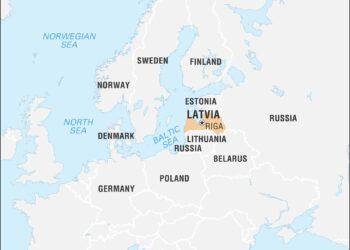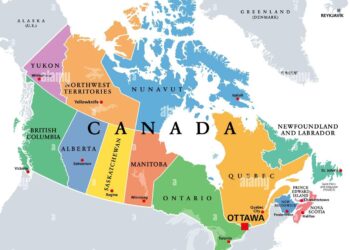In a notable step towards enhancing regulatory frameworks for digital currencies and virtual assets, the Bank of Latvia recently hosted an advanced workshop in collaboration with the Organization for Security and Co-operation in Europe (OSCE).This event, which gathered experts, policymakers, and financial regulators from across the region, aimed to address the pressing need for comprehensive regulations in the rapidly evolving landscape of virtual assets. as the global economy increasingly integrates digital financial solutions, the workshop provided a platform for stakeholders to share insights, explore best practices, and develop strategies to mitigate risks associated with these innovative financial products. With the OSCE’s commitment to fostering security and stability across its member states, this initiative underscores the critical intersection of technology and finance in today’s world.
Bank of Latvia Leads the Charge in Virtual Asset Regulation with OSCE Workshop
The Bank of Latvia has taken a significant step in shaping the future of virtual asset regulation by hosting an advanced workshop in collaboration with the Organization for Security and Co-operation in Europe (OSCE).This initiative aims to bolster dialogues among international experts, regulators, and stakeholders about the challenges posed by digital currencies and cryptocurrencies. Participants explored key regulatory frameworks, addressing issues such as anti-money laundering (AML), combating the financing of terrorism (CFT), and the need for harmonized practices across jurisdictions.
Throughout the workshop, experts presented a variety of approaches to regulation, emphasizing the importance of adaptability in policies to keep pace with the rapidly evolving digital landscape. Highlights included discussions on:
- Regulatory best practices for emerging technologies
- Risk assessment methodologies for financial entities involved in virtual assets
- Collaborative frameworks between countries to enhance regulatory coherence
These discussions not only facilitated knowledge sharing among the attendees but also laid the groundwork for future collaborative efforts in combating illicit activities associated with virtual assets. The outcomes of the workshop underscore the Bank of Latvia’s commitment to pioneering effective and forward-thinking regulatory strategies in the realm of digital finance.

Key Takeaways from the OSCE Workshop on Emerging Trends in Virtual Asset Regulation
The OSCE workshop on virtual asset regulation,hosted by the Bank of Latvia,highlighted several emerging trends that are shaping the regulatory landscape. Participants discussed the shift toward a more obvious framework, emphasizing the importance of international collaboration. Key themes included:
- Standardization of Regulations: The need for uniform regulations across jurisdictions to prevent regulatory arbitrage.
- Risk-based Approaches: Tailoring regulations to address specific risks associated with virtual assets and their use cases.
- Consumer Protection: Ensuring that consumer interests are safeguarded while fostering innovation in the virtual asset space.
Furthermore,the workshop underscored the importance of leveraging technology in regulatory frameworks. With advancements in blockchain and digital currencies, regulators are encouraged to adopt regtech solutions that can enhance compliance and monitoring. The following are notable insights from the discussions:
| Insight | Implication |
|---|---|
| Increased Use of AI | Can improve fraud detection and compliance reporting. |
| Decentralized finance (DeFi) Challenges | Highlights the need for adaptable regulatory frameworks. |
| Digital Identity Verification | enhances know-your-customer (KYC) measures. |

The Need for Robust Frameworks: Insights from Experts at the Workshop
During the recent workshop organized by the Bank of Latvia and the OSCE, industry experts converged to address the pressing necessity for stronger regulatory frameworks in the realm of virtual assets. The dialog underscored a consensus: without robust structures, financial institutions and regulators face significant challenges in preventing illicit activities. Key insights from panel discussions highlighted the critical role that regulatory clarity plays in fostering innovation while ensuring compliance and protection for consumers. Participants noted the following major points:
- Navigating Uncertainty: Experts emphasized the importance of clear regulations to guide businesses and investors.
- Risk Mitigation: Comprehensive frameworks can significantly reduce the potential for fraud and financial crime.
- Cross-Border Cooperation: Effective regulation requires collaboration among international entities to address the global nature of virtual assets.
The workshop also featured a practical segment where participants evaluated existing frameworks from various jurisdictions. This led to an engaging experience, allowing attendees to share best practices and innovative approaches. A comparative analysis was conducted using a structured table to display different jurisdictions’ regulatory responses:
| Jurisdiction | Framework Type | Status |
|---|---|---|
| European Union | Comprehensive Regulation | In Progress |
| United States | State-Level Guidelines | Varied |
| Singapore | Licensing and Compliance | Established |
The collective expertise and diverse perspectives gathered during the workshop illuminated the multifaceted needs of the industry. Participants left with a renewed commitment to advocating for frameworks that protect users while allowing for the growth of innovation in the virtual asset space.

Recommendations for Policymakers: Enhancing Regulatory Approaches to Virtual Assets
Considering the rapid evolution of virtual assets, policymakers are urged to adopt a multifaceted approach that balances innovation with robust regulatory frameworks.This can be achieved by implementing the following strategies:
- Collaborative Regulation: Encourage partnerships between regulators, industry stakeholders, and technology experts to create adaptable regulations that respond to the fast-paced nature of virtual assets.
- Consumer Protection Mechanisms: Develop clear guidelines focusing on consumer rights, ensuring that users are informed about risks and have avenues for recourse.
- International Standards Alignment: Work towards harmonizing local laws with international standards to facilitate cross-border transactions and reduce regulatory arbitrage.
- Technological Transparency: Mandate that virtual asset service providers (VASPs) disclose necessary information regarding their operations and security measures to build trust with consumers.
Furthermore, the integration of a risk-based approach in regulation can significantly enhance regulatory efficacy. Implementing tiered regulatory frameworks tailored to different types of assets and their associated risks will provide better protections while fostering innovation. Consider the following aspects:
| Aspect | Recommendation |
|---|---|
| Taxation Policy | Establish clear tax guidelines to encourage legitimate asset transactions without stifling growth. |
| AML/CFT Compliance | Enhance Anti-money Laundering and Counter Financing of Terrorism measures specific to virtual assets. |
| Research and Innovation Support | Invest in research that explores the implications of emerging technologies on virtual asset markets. |

Future Implications of Virtual Asset Regulation for Financial Stability and Security
The regulation of virtual assets presents a dual-edged sword for the financial landscape. On one hand, it aims to enhance financial stability by creating standardized practices across jurisdictions, which could reduce the risks associated with market volatility and decrease instances of fraud. by implementing a framework that governs virtual asset transactions, regulators can mitigate concerns over liquidity and operational risks. This will likely foster greater trust among customary financial institutions, encouraging their involvement in the burgeoning virtual asset market through mechanisms such as:
- Enhanced compliance measures to thwart financial crimes.
- Improved transaction transparency that can lead to reduced market manipulation.
- Increased investor protection through established regulatory guidelines.
However, the implications of these regulations extend beyond mere stability; they also touch upon the security of financial ecosystems in a digital age. As authorities push for stricter regulatory frameworks, challenges such as the pace of technological advancement, the adaptation of existing financial structures, and the potential for regulatory arbitrage will arise.Institutions and platforms may need to:
| Challenges | Implications |
|---|---|
| Technological Adaptation | Investment in new systems and training to stay compliant. |
| Inconsistent Standards | Difficulty in cross-border transactions and increased complexity. |
| Regulatory Arbitrage | Potential shifts of business to jurisdictions with looser regulations. |
Through proactive engagement and collaboration among global regulators, financial stability can not only be enhanced but also secured against the myriad challenges that come with integrating virtual assets into the mainstream financial system.

Collaboration and Innovation: Building a Unified Approach to Virtual Asset Oversight
The OSCE advanced workshop, recently hosted by the Bank of Latvia, served as a pivotal platform for fostering collaboration among stakeholders in the rapidly evolving landscape of virtual asset regulation. Participants included representatives from various national governments, regulatory bodies, and financial institutions, all united by a shared goal to enhance regulatory frameworks that adapt to the challenges posed by virtual assets. The discussions focused on creating a cohesive strategy that encompasses best practices, risk assessments, and enforcement mechanisms, ensuring that legislation keeps pace with technological advancements while maintaining financial stability and consumer protection.
Key takeaways from the workshop emphasized the importance of information sharing and cross-border cooperation. collective insights revealed that a unified approach could significantly improve regulatory effectiveness in areas such as anti-money laundering (AML) and combating the financing of terrorism (CFT). Participants highlighted several actionable strategies, including:
- Harmonized Regulations: Encouraging standardization of regulations across jurisdictions to reduce compliance costs and regulatory arbitrage.
- Joint Training Programs: Developing educational initiatives that enhance the competency of regulators and industry professionals in managing virtual assets.
- Real-time Data Sharing: Implementing secure platforms for sharing information related to suspicious activities involving virtual assets.
This cooperative effort aims not only to bolster the integrity of financial systems but also to create a sustainable surroundings for innovation in the rapidly diversifying world of digital finance. As the landscape continues to shift, maintaining a proactive dialogue among key players becomes essential for shaping future regulations that can effectively govern the complexities of virtual asset ecosystems.
Insights and Conclusions
the advanced workshop hosted by the Bank of Latvia marks a significant step forward in the collective effort to establish a coherent regulatory framework for virtual assets. As the digital financial landscape rapidly evolves, collaborative initiatives like this are essential for equipping policymakers and regulators with the knowledge and tools necessary to manage the associated risks while fostering innovation. With participants from various sectors and regions contributing their insights, the workshop serves as a crucial platform for dialogue on best practices in virtual asset regulation. As the OSCE continues to prioritize financial security and stability, the outcomes of this workshop will undoubtedly play a pivotal role in shaping the future discourse on virtual asset governance across Europe and beyond.












JD Vance says US and UK ‘working very hard’ on trade deal and will come to a ‘great agreement’ – Sky News